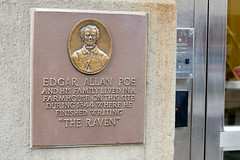Edgar Allan Poe


Edgar Allan Poe
(1809-1849)
Family tree
Commemorated on 8 plaques
Edgar Allan Poe 1809-1849 writer and poet was a pupil at the Manor House School (1817-20), which stood on this site
172 Stoke Newington Church Street, Hackney, London, United Kingdom where they attended school
1809 1849 Edgar Allan Poe poet - storywriter - critic Born on Carver Street January 19, 1809, to David and Elizabeth (Eliza) Poe, actors at the Boston Theatre. In 1827 published his first book, Tamerlane and Other Poems, at a shop on the corner of Washington and State Streets and enlisted in the U.S. Army at Fort Independence, Boston Harbour. Lectured in Boston October 16, 1845. Published 'Landor's Cottage', his last tale, in Boston's Flag Of Our Union, June 9, 1849. Died at Baltimore October 7, 1849.
Carver Street, Boston, MA, United States where they was born near (1809)
Edgar Allan Poe and his family lived in a farmhouse on this site during 1844 where he finished writing "The Raven"
?, New York, NY, United States where they lived (1843)
EDGAR ALLAN POE Born 1809, Died 1849 American romancer, poet & critic Was a pupil At the Manor House School Which stood near this spot During his boyhood 1817-1820 Erected 1949 the centenary of his death
Stoke Newington Library, Stoke Newington Church Street, London, N16 0JS, London, United Kingdom where they studied (1816-1819)
Site of Poe's death. This structure, now the east building of Church Hospital, was erected in 1836 to house the Washington Medical College. Edgar Allan Poe, author and poet, was brought here, ill and semi-conscious, on October 3, 1849 and died four days later in 1857. The building was purchased by Church Home and Infirmary, which was renamed Church Home and Hospital in 1943.
Church Home and Hospital, N Broadway, Baltimore, MD, United States where they died (1849)
Edgar Allan Poe was here 1848-1849 reading poems, exploring the town, nurturing his friendship with Nancy Heywood Richmond ("Annie")
, Westford, MA, United States where they visited (1848-1849)
The Latrobe House. On an evening in October, 1833, three of Baltimore's most discerning gentlemen were gathered around a table in the back parlor of this house. Fortified with "some old wine and some good cigars," John Pendleton Kennedy, James H. Miller and John H. B. Latrobe poured over manuscripts submitted in a literary contest sponsored by the Baltimore Sunday Visitor. Their unanimous choice for best prose tale was "M8. Found in a Bottle," a curious and haunting tale of annihilation. The fifty dollar prize was awarded to the story's unknown, penniless author Edgar Allan Poe. Poe had come to Baltimore in the spring of 1831, after his dismissal from West Point. He had no money, no trade and no reputation. The four years he spent in Baltimore were a period of intense creativity. His major effort during those years were sixteen tales he wrote for the Folio Club, an imaginary literary club of his creation. One of these sixteen tales was "M8. Found in a Bottle." The prize for this story, the public recognition that it brought and the lifelong friendship it generated between Poe and literary patron Kennedy helped to launch Poe on his brilliant career. He left Baltimore in 1835 to become editor of the Southern Literary Messenger.
, Baltimore, MD, United States where they lived near
To the memory of Edgar Allan Poe who spent his last days in this house.
Church Home and Hospital, N Broadway, Baltimore, MD, United States where they died (1849)

,_which_stood_on_this_site.jpg?width=250)



